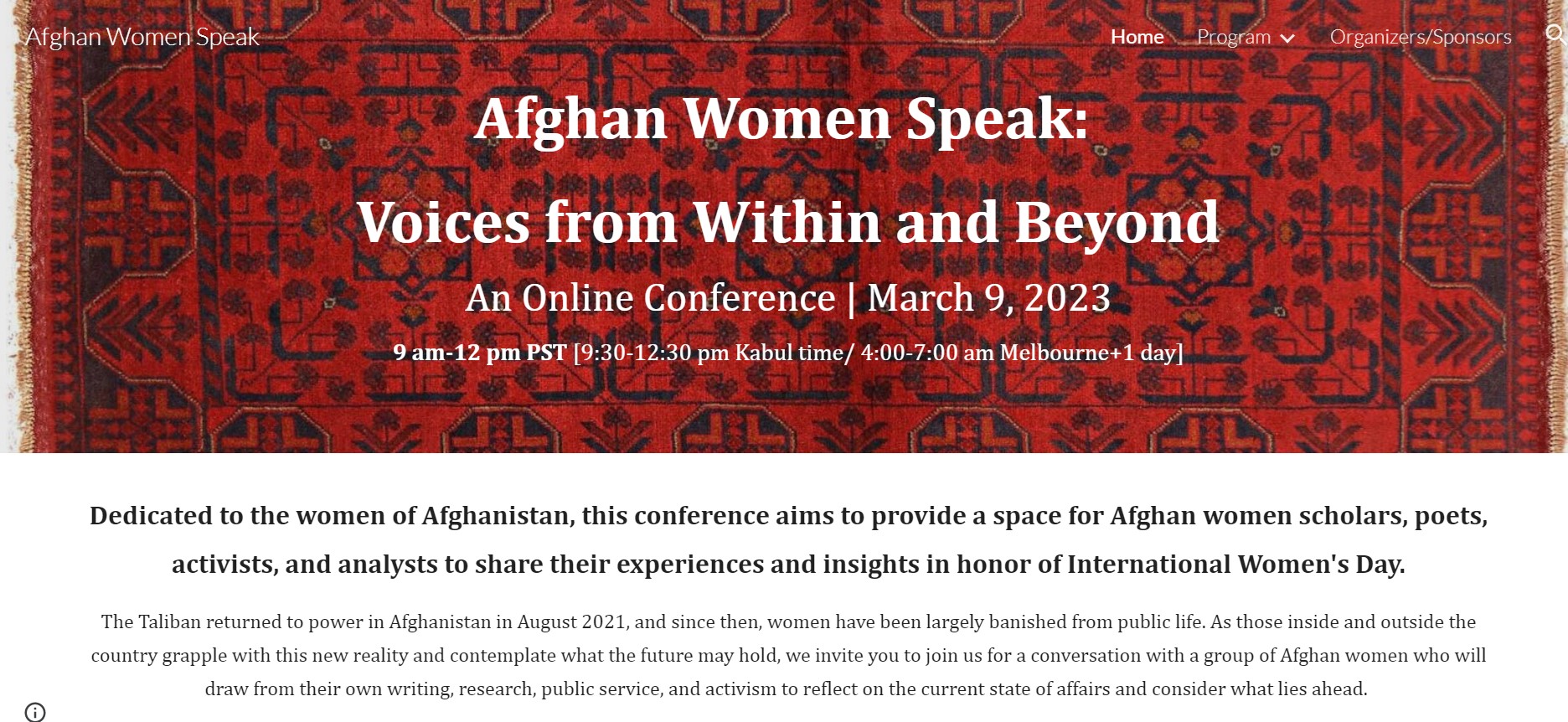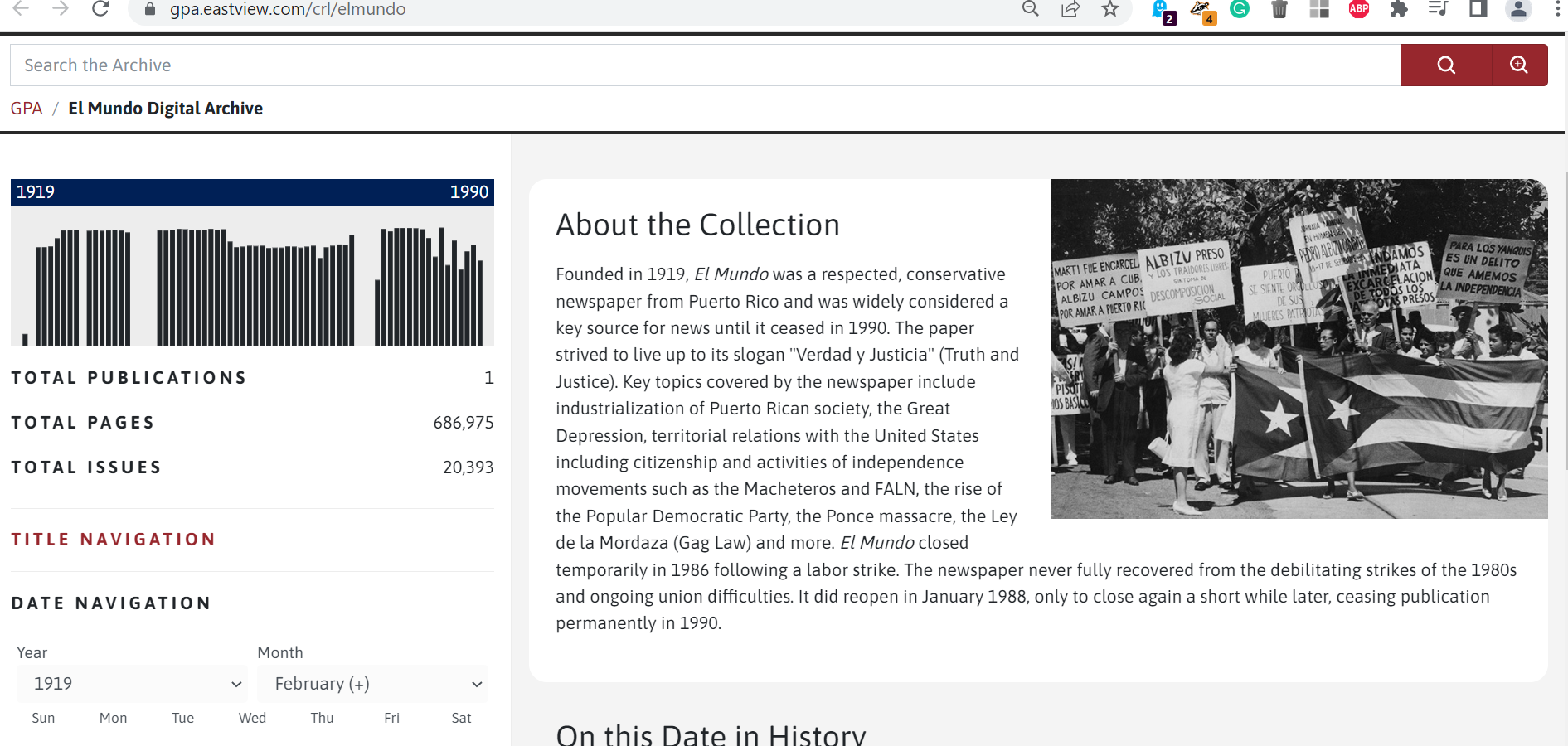Author: Liladhar
Center for Research Libraries releases Soviet-Era Ukrainian Newspapers Online
Center for Research Libraries in collaboration with the Global Press Archive of East View has released its latest digital collection of select Soviet-Era Ukrainian Newspaper. The collection can be accessed here: https://gpa.eastview.com/crl/seun/ or here
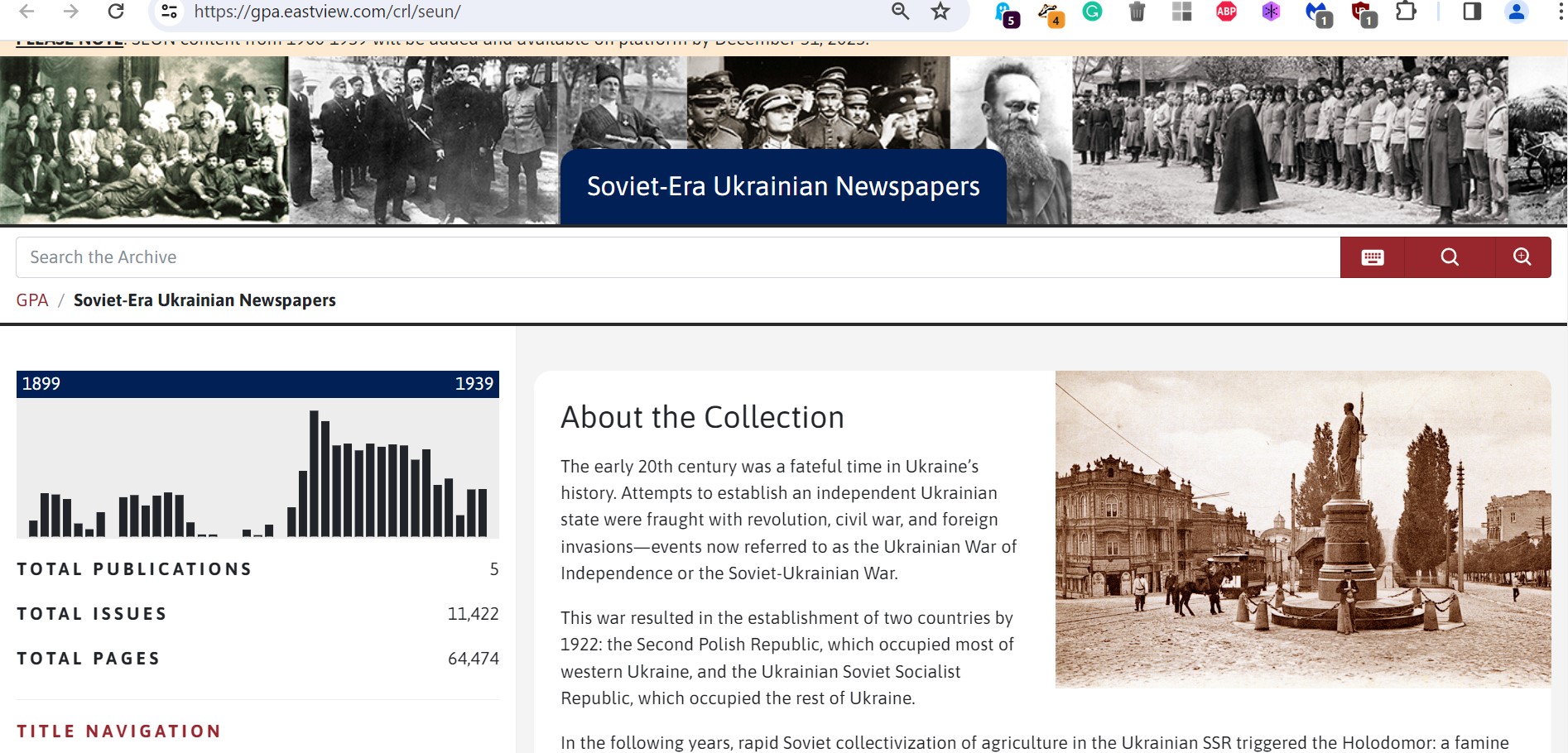
About the collection:
The early 20th century was a crucial time in Ukraine’s history, marked by attempts to establish an independent state, leading to the Ukrainian War of Independence. This conflict resulted in the creation of two countries by 1922: the Second Polish Republic in western Ukraine and the Ukrainian Soviet Socialist Republic in the rest of the country.
Following this, rapid Soviet collectivization in the Ukrainian SSR triggered the Holodomor, a famine that began in 1932 and claimed millions of lives.
The Soviet-Era Ukrainian Newspapers (SEUN) collection, with over 50,000 pages and five titles, documents Ukraine’s history during this turbulent period, including events leading up to WWII. It includes newspapers from Kyiv, Kharkiv, and Lviv, featuring content in both Ukrainian and Russian.
Sovetskii Ekran (Soviet Film) Digital Archive at UC Berkeley Library
The Library has purchased the Digital Archive of a Soviet film magazine: Sovetskii Ekran. The archive provides access to the full-text of journal issues that were published from 1925-1998.
Below is the screenshot of the landing page of the Sovietskii Ekran.

At the time of writing this blog, the digitization of issues was completed through 1970 and the additional digitization was in progress.
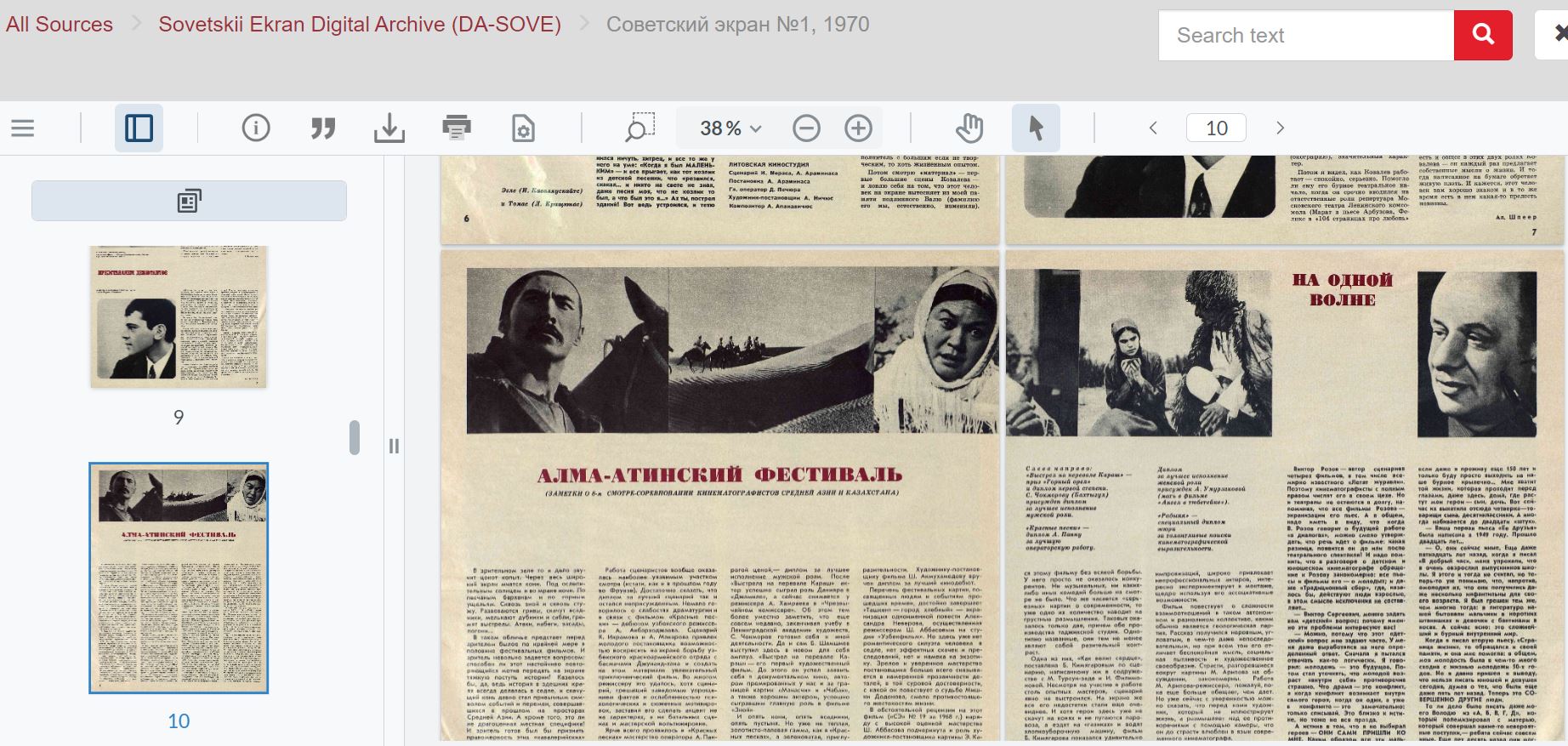
About the journal:
Soviet Screen was a magazine in the USSR that ran from 1925 to 1998 (with a break from 1941 to 1957). It talked about movies, both from the Soviet Union and other countries, cinema history, and had articles critiquing films. They also had reader polls each year to pick the best film, actor, actress, film for children, and music film.
The magazine had different names over the years, like Screen Film Gazeta in 1925, Cinema and Life in 1929–1930, Proletarian Cinema from 1931–1939, and Screen from 1991–1997. Before 1992, it was connected to the Union of Cinematographers of the USSR State Committee for Cinematography and the USSR.
In 1984, they printed 1.9 million copies. In 1991, the editor was Victor Dyomin, and the magazine was published under the title: Screen. It started coming out less often, monthly instead of more frequently. It kept going as Screen Magazine until 1997, then for a few months in 1997-1998, it went back to its old name-Soviet Screen. But it couldn’t survive the financial troubles in 1998 and had to stop publishing (Source: Wikip.).
Library Trial: Znamia Digital Archive (Soviet-era periodical)
At the library, we have set up a thirty-day trial of Znamia Digital Archive through November 18, 2023.
The extensive archive of Znamia (Знамя, Banner), a highly regarded Soviet/Russian “thick journal” (tolstyi zhurnal), covers more than nine decades and is a rich source of intellectual and artistic contributions. This monthly publication has been a vibrant platform for literature, critical analysis, philosophy, and, at times, political commentary.
Originally introduced in January 1931 as LOKAF (Локаф), an acronym for the Literary Association of the Red Army and Navy, the journal officially adopted the name Znamia, which translates to “Banner” in English, in 1933. Throughout its history, Znamia has played a crucial role in presenting the works of renowned authors such as Anna Akhmatova, Alexander Tvardovsky, Yevgeny Yevtushenko, Konstantin Paustovsky, Yuri Kazakov, and Yuri Trifonov.
During the era of Perestroika, starting in 1986, Znamia underwent a significant transformation and became one of Russia’s most widely read literary journals, serving as a herald of the Perestroika movement.
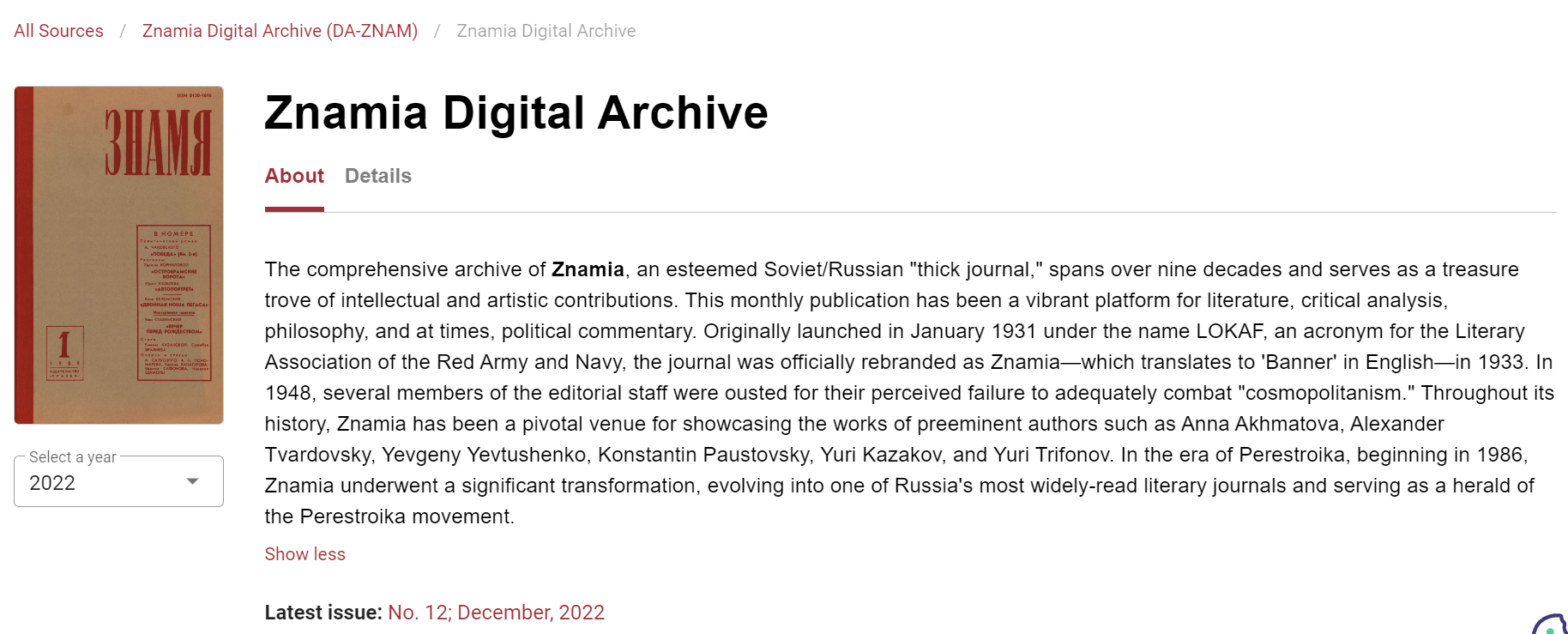
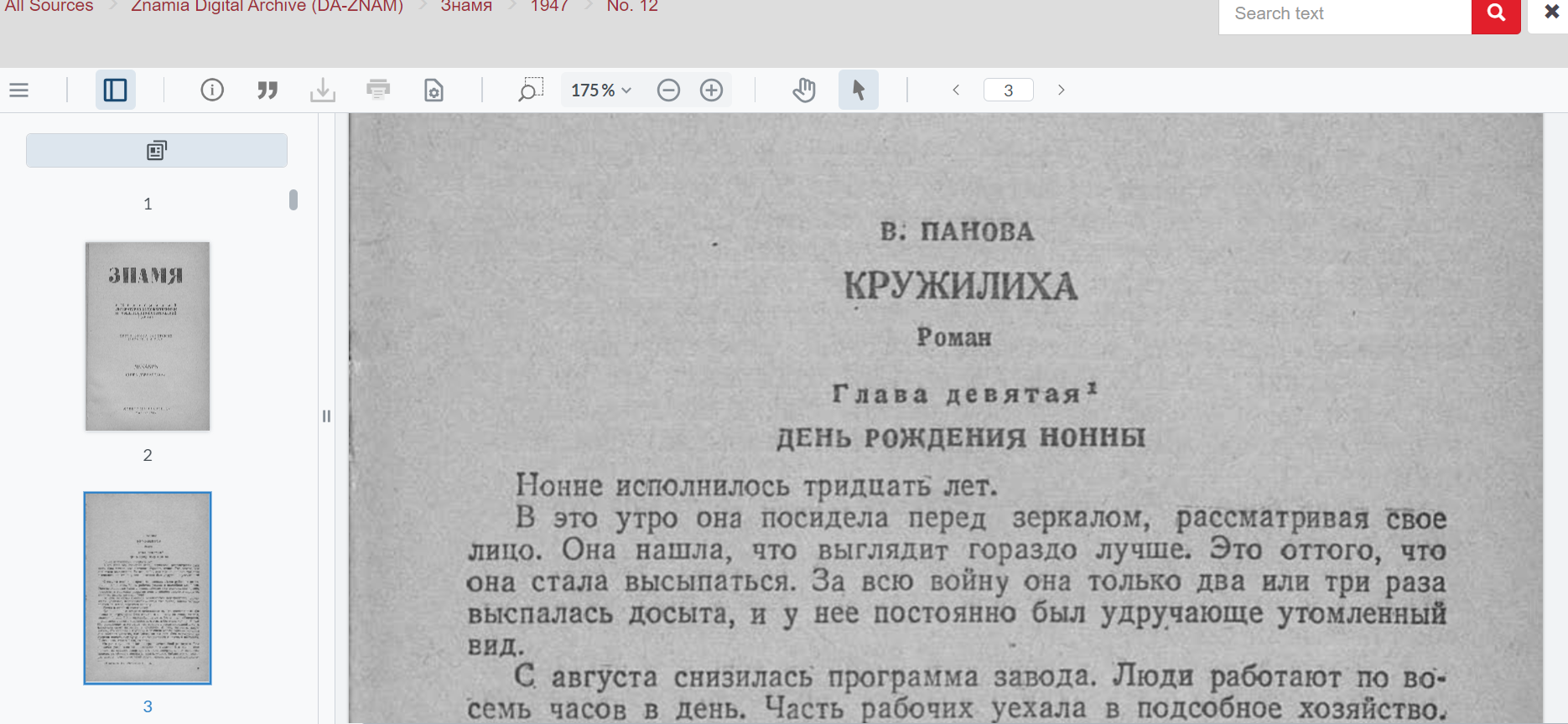
Access Link: https://libproxy.berkeley.edu/login?qurl=https%3A%2F%2Fdlib.eastview.com%2Fbrowse%2Fudb%2F6250
Third annual Hispanic Heritage Month Celebration Webinar at UC Berkeley Library
- Sarah Aponte; Chief Librarian, Dominican Studies Institute, CUNY
- Dr. Irma Guadarrama, former professor/ researcher and writer at Houston University–author of a 2023 book, “To Change the Impossible World: Central American Women in Struggle and Resistance.”
- Kathia Salome Ibacache, Librarian for Romance Languages
- David Woken, Latin American and Caribbean Studies Librarian, University of Chicago
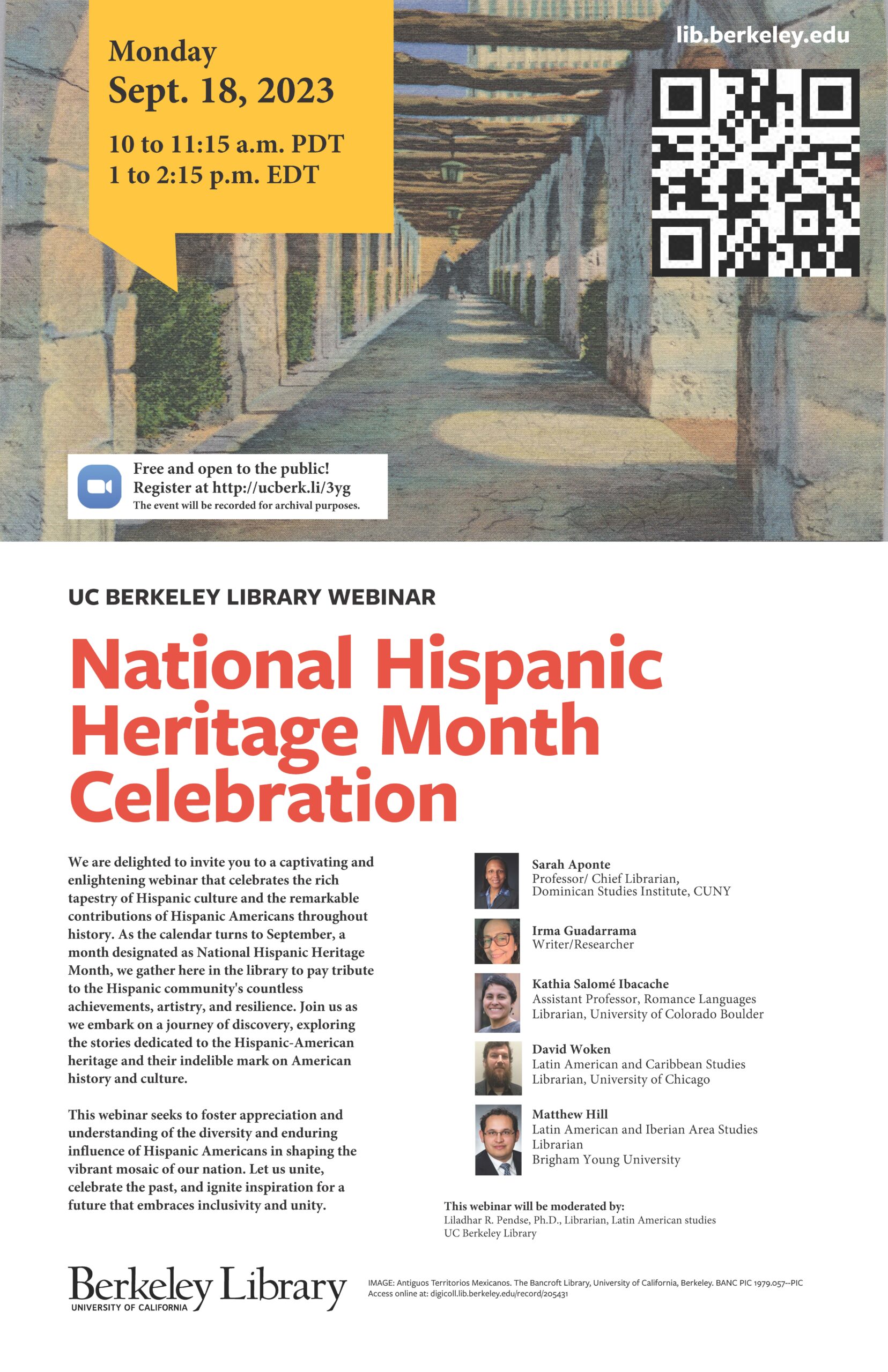
National Hispanic Heritage Month Celebration Webinar 2023 at UC Berkeley Library
Prensa Libre (Guatemalan Newspaper) Archive Trial at UC Berkeley Library
The Library has started a thirty-day trial of Prensa Libre Newspaper. One can access the resource by authenticating from an off-campus location using the following hyperlink: https://libproxy.berkeley.edu/login?qurl=https%3A%2F%2Fgpa.eastview.com%2Fpren%2F
Currently, the full-text content is available for the issues starting in 1980 through 2022.
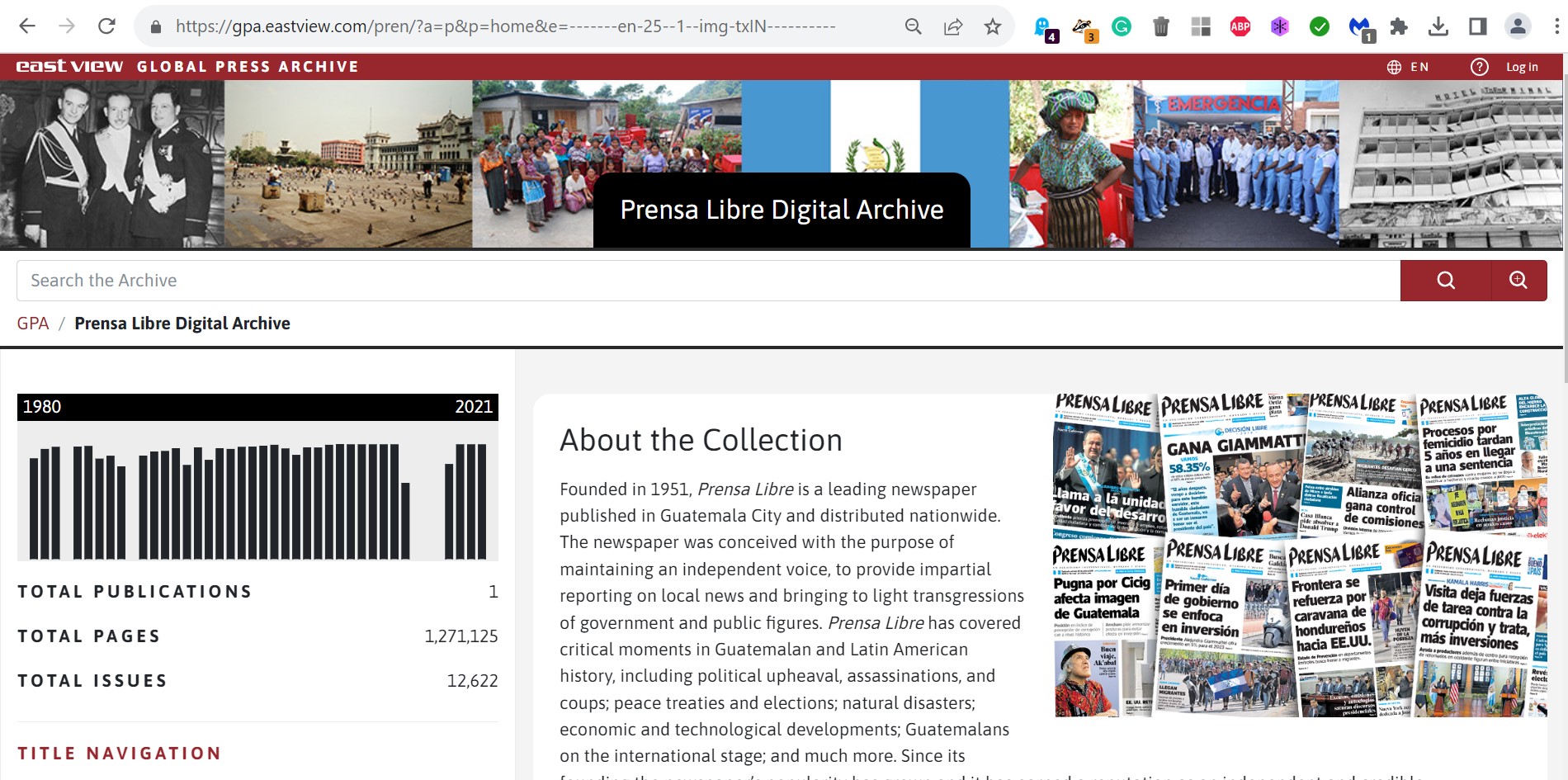
Prensa Libre fue fundado el 20 de agosto de 1951 por Pedro Julio García, Álvaro Contreras Vélez, Salvador Girón Collier, Mario Sandoval Figueroa e Isidoro Zarco Alfasa.
Prensa Libre is a Guatemalan newspaper published in Guatemala City by Prensa Libre, S.A. and distributed nationwide. It was formerly the most widely circulated newspaper in the country and as of 2007 it has the second-widest circulation.[1] It is considered a local newspaper of record. It was founded in 1951. (Source: Wikipedia)
In memoriam: Dr. Richard Hovannisian (UCLA)–Obituary by Professor Bedros der Matossian
Today Milan Kundera passed, and the whole literary world grieved; likewise, I grieved. I often ask myself why some deaths get marked albeit more while the others, such as those of migrants who drowned on their way to Europe or the Honduran female inmates who were killed in prison, were forgotten by many.
I believe life and death are part of being human or animate. When I heard the news of passing Professor Richard Hovannisian of Armenian History at UCLA yesterday, I grieved. In the Winter of 2002, when many of the UCLA classes were full and as a transfer student-immigrant, I had no idea what class in History I should enroll in as UCLA felt like an Indian jungle; Professor Hovanissian came out of new and suggested, I take his class on Armenian History. He also mentioned that although his class was full, he would gladly have an extra-Indian voice. I am forever grateful to him for admitting me to a course that opened the door to a new cultural, civilizational, and linguistic experience. His teaching style and compassion have remained with me to this day, for he was my first university professor. He was always supportive of my work as a professional librarian at UCLA. We have all his books
RIP Professor Hovannisian
Here is the obituary Professor Bedros de Matossian wrote on the Society of Armenian Studies email list.
“On July 10, the Society for Armenian Studies, the academic world, the field of Armenian Studies, and the Armenian nation lost one of the most prominent icons of the modern period: Prof. Richard G. Hovannisian (1932-2023). Hovannisian was a monumental figure in the field of Armenian Studies. Considered as the Dean of Modern Armenian History, he established the field of Modern Armenian History in the Western Hemisphere. He supported the establishment of some of the most important chairs in Armenian Studies in the United States. Hovannisian was the child of Genocide survivors. His father, Kaspar Gavroian, was born in in the village of Bazmashen near Kharpert in 1901. Unlike others, he survived the Genocide and arrived in the U.S. He changed his last name from Gavroian to Hovannisian after his father Hovannes. In 1928 Kaspar married Siroon Nalbandian, the child of Genocide survivors. They had four sons: John, Ralph, Richard, and Vernon. Richard was born in Tulare, California, on November 9, 1932. Being the son of Genocide survivors played an important role in his academic path. In 1957, he married Dr. Vartiter Kotcholosian in Fresno and had four children: Raffi, Armen, Ani, and Garo. Raffi would become the first Minister of Foreign Affairs (1991-1992) of the Modern Republic of Armenia.
Hovannisian began his academic life in 1954 by earning a B.A. in History, followed by an M.A. in History from the University of California, Berkley. In 1966, he earned his Ph.D. from the University of California, Los Angeles (UCLA). His dissertation was published in 1967 with the title Armenia on the Road to Independence which was the precursor to the four-volume magnum opus The Republic of Armenia. Hovannisian played an important role in establishing the teaching of Armenian history at UCLA. In 1987, he became the first holder of the Armenian Education Foundation Chair in Modern Armenian History at UCLA, which after his retirement was named in his honor as the Richard Hovannisian Endowed Chair in Modern Armenian History, with Prof. Sebouh Aslanian as its first incumbent.
Hovannisian was a Guggenheim Fellow and received numerous prestigious national and international awards for his service to the field and civic activities. He served on the Board of Directors of multiple national and international educational institutions and was a member of the Armenian National Academy of Sciences. After finishing his four-volume The Republic of Armenia, he dedicated his research and career to battling the denial of Armenian Genocide, resurrecting the history of Armenian towns and villages of the Armenian Provinces of the Ottoman Empire, and writing textbooks on modern Armenian history. Although not a scholar of Armenian Genocide, he has contributed more to the discipline than many others in the field. He edited multiple volumes on different facets of the Armenian Genocide, including historical, literary, and artistic perspectives. Hovannisian also spearheaded a monumental project to preserve the eyewitness accounts of the Armenian Genocide survivors.
In the 1970s, he launched the Armenian Genocide oral history project. He and his students interviewed more than 1,000 Armenian Genocide survivors in California. In 2018, Hovannisian donated the collection to the USC Shoah Foundation’s Visual History Archive to be available to scholars around the world. He single-handedly edited and published 15 volumes with Mazda Press as part of the UCLA Armenian History & Culture Series. The 15 volumes covered the history of Armenians in Van/Vaspourakan, Cilicia (with Simon Payaslian), Sivas/Sepastia, Trebizond/Trabzon, Baghesh/Bitlis, Taron/Mush, Smyrna/Izmir, Kesaria/Kayseri and Cappadocia among other places. The final book in the series, The Armenians of Persia/Iran, was published in 2022. Hovannisian’s also edited the two-volume The Armenian People from Ancient to Modern Times, which is considered a classic Armenian History textbook.
Hovannisian came from a generation that fought against the stifling of Armenian voices within the fields of Middle Eastern and Ottoman Studies, which had relegated Armenian Studies to second-class status. He fought for the relevance of Armenian Studies within these fields and tirelessly fought against the efforts to marginalize Armenian issues and to deny the Armenian Genocide.
Besides his contribution to the field, Hovannisian also mentored and educated multiple generations of scholars and thousands of students. He was a strict mentor who demanded that his students work to reach their full potential. He wanted to make sure that they would survive and thrive in the tough terrain of the academic job market.
In his lifetime, Hovannisian was especially influenced by two people: his wife Vartiter and Simon Vratsian (the last Prime Minister of the First Republic of Armenia). Vartiter was his life’s partner for more than half a century. Her dedication to Richard and the field of Armenian Studies played an important role in shaping who Richard became. Vartiter was an intellectual companion who read and reviewed every piece that he wrote. She was also a constant presence at every conference he planned or attended. In the early 1950s, Vratsian, the author of a major book on the First Republic, became Hovannisian’s mentor when he studied Armenian language at the Hamazkayin Nishan Palanjian Jemaran in Beirut, Lebanon. This influence led Hovannisian to write the first academic work on the First Republic of Armenia and created the first step for his academic career.
In 1974, Hovannisian along with Dickran Kouymjian, Nina Garsoïan, Avedis Sanjian, and Robert Thomson spearheaded the project to establish a Society for Armenian Studies (SAS). Considered as the pillars of Armenian Studies, the main objective of this group was the development of Armenian Studies as an academic discipline. With access to very limited resources, this group of scholars was able to establish the foundations of a Society that would play a dominant role in developing Armenian Studies in North America and beyond. From a handful of chairs and programs that supported the initiative at the time, today Armenian Studies as a discipline has flourished in the United States with more than thirteen chairs and programs providing their unconditional support to the Society. Hovannisian was the president of SAS for three terms (1977, 1991-1992, 2006-2009). During his tenure the Society flourished and achieved major accomplishments in the field.
In 2019, the Society for Armenian Studies awarded Hovannisian with the SAS Life Time Achievement Award in recognition and appreciation for his outstanding service and contribution to the field of Armenian Studies.
Hovannisian’s legacy will remain for generations to come.
Our hearts go out to his family and beloved ones.
Obituary by Bedross Der Matossian
Past President of SAS (2018-2022)
University of Nebraska, Lincoln”
El Mundo Digital Archive (Puerto Rico): 1919-1990 [Open Access]
I am glad to report that the Center for Research Libraries, in collaboration with Eastview’s Global Press Archive platform, has released the full text of El Mundo newspaper published in Puerto Rico from 1919-1990.
Established in 1919, El Mundo was a well-respected and conservative newspaper hailing from Puerto Rico, widely acknowledged as a prominent news source until its cessation in 1990. The publication diligently aspired to uphold its motto of “Verdad y Justicia” (Truth and Justice). El Mundo extensively covered a range of significant topics, including the industrialization of Puerto Rican society, the impact of the Great Depression, territorial relations with the United States encompassing citizenship, activities of independence movements such as the Macheteros and FALN, the emergence of the Popular Democratic Party, the Ponce massacre, the enactment of the Ley de la Mordaza (Gag Law), and more. In 1986 El Mundo temporarily closed due to a labor strike, which inflicted lasting damage on the newspaper. Despite reopening in January 1988, the publication faced ongoing union difficulties and ceased operations permanently in 1990.
Webinar on March 21st: Ukrainian Publishers and Literary Critics Speak
Ukraine Fights On: One Year Later
Ukrainian Publishers and Literary Critics Speak
In this second event, women publishers and literary critics from Ukraine will update us on the current state of publishing, the different strategies they are using to mitigate the tragic circumstances of their war, and how publishing has evolved since the Russian invasion of Ukraine.
Date: Mar 21, 2023
Time: 9:30 am PDT /12: 30 pm EDT/ 19:30 Kyiv Time
Duration: 1 hr. 15 min.
Language of Event: English.
All are welcome with prior registration.
Link for event registration: http://ucblib.link/ukrainefightson2
Speakers
- Iryna Baturevych co-founded the Chytomo media project (NGO), the largest independent media covering publishing and contemporary literary and cultural processes in Ukraine.
- Anastasia Bilousova is an editor and project manager at the RODOVID Press publishing house in Kyiv.
- Lidia Lykhach is the executive editor and founder of RODOVID Press.
Discussant
Aglaya Glebova is an Associate Professor in the History of Art at the University of California, Berkeley.
Organizer: Dr. Liladhar R. Pendse, Librarian for Slavic, East European, and Eurasian Studies
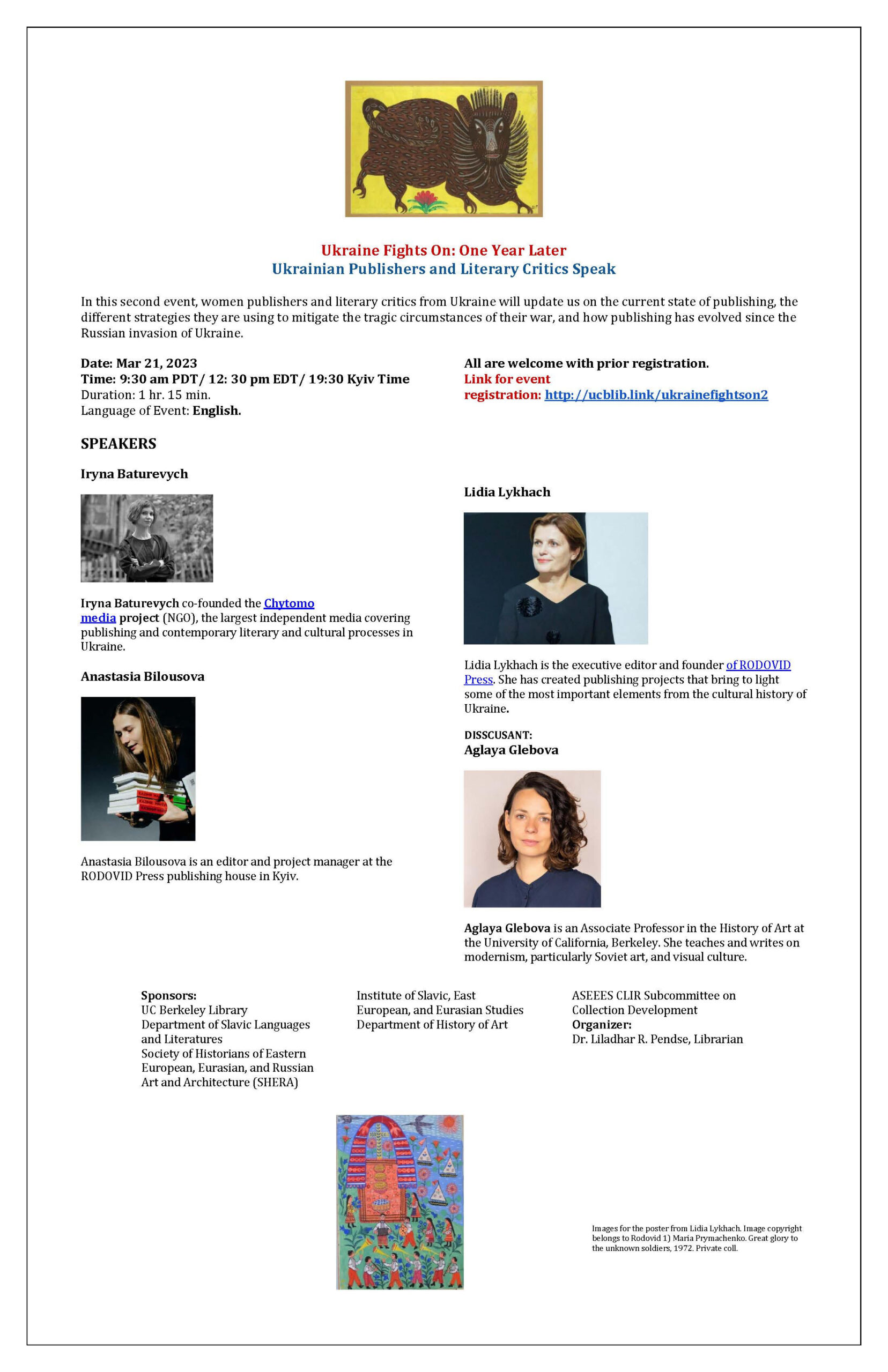
Armeno-Indica: Four Centuries of Familiarity and Friendship Conference at UCLA
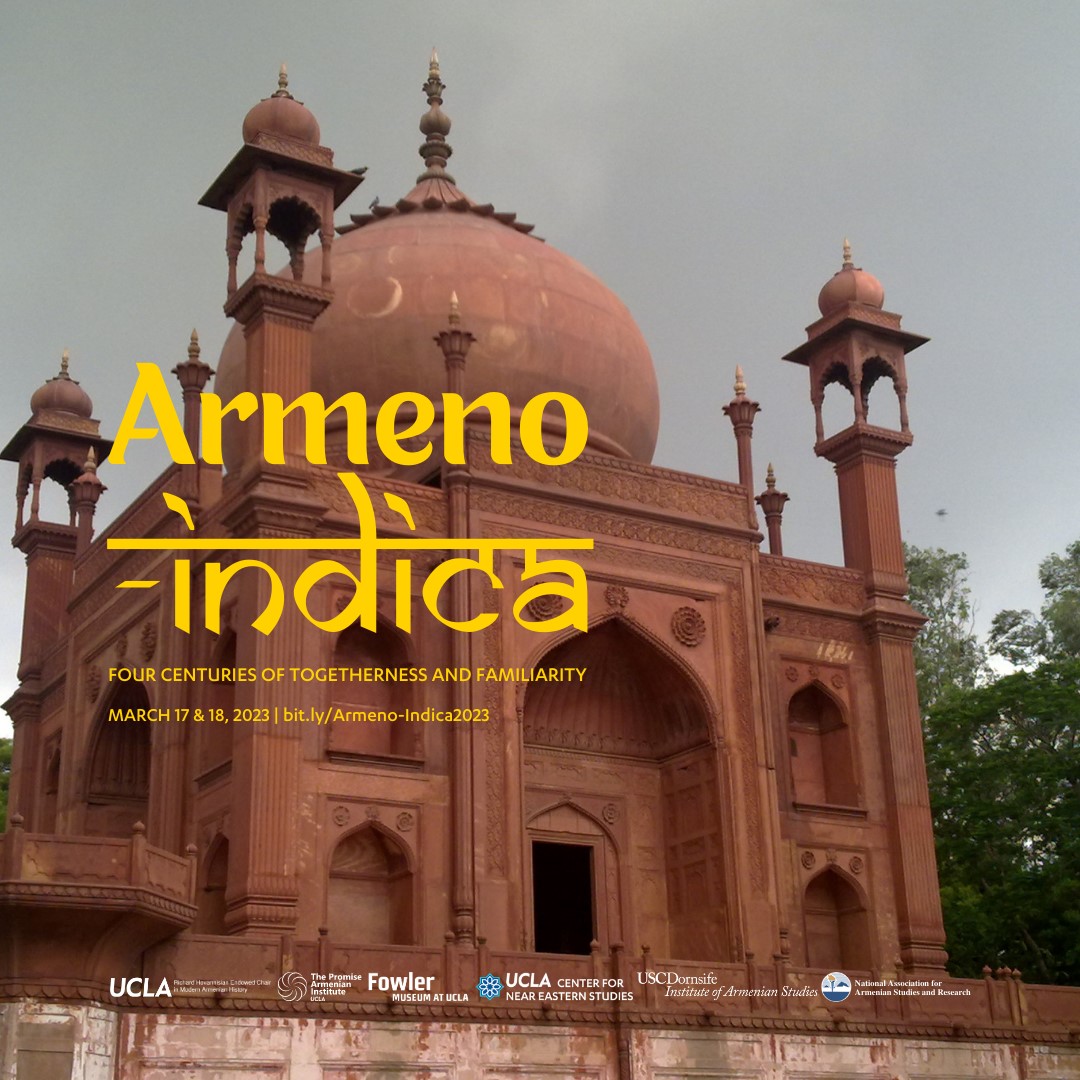
Armeno-Indica: Four Centuries of Familiarity and Friendship
March 17 – March 18
This event is organized by the UCLA Richard Hovannisian Endowed Chair in Modern Armenian History.
Friday, March 17, 2023, | 10:00 AM – 6:30 PM (Pacific Time)
to
Saturday, March 18, 2023, | 11:30 AM – 6:00 PM (Pacific Time)
Postponed due to the pandemic, this international conference celebrates the bicentenary of the founding of Kolkata’s famed Armenian College (est. 1821), one of three centers of Armenian higher learning in the diaspora during the nineteenth century and the only one that has survived and is thriving today. Bringing together economic, literary, legal, and cultural historians from India, Armenia, France, the United Kingdom, Germany, and the United States, the conference highlights how, beginning in the early modern period and continuing to the present, Armenians have traveled to India to make its distant shores and cultures their own. India looms large in the Armenian social imaginary. It was not only the place where the first Armenian proto-constitution for an “imagined” nation-republic was published (Madras 1788/9), it was also the cradle of the first Armenian newspaper (Madras, 1794-1796), the first modern Armenian play (Calcutta 1823), and arguably also where the first Eastern Armenian novel appeared (Calcutta, 1846), as well as where the first Armenian “feminist” tract (Calcutta, 1847) was published.
Gathering an international group of scholars, Armeno-Indica explores the Indo-Armenian saga in South Asia from the seventeenth to the twenty-first centuries. The themes to be explored include the connected economic, literary, legal, and political histories of Armenians and Indians in South Asia and beyond across the waters of the Indian Ocean. The keynote for the conference will be delivered by Professor Sanjay Subrahmanyam.
Please fill out the form for providing RSVP for in-person attendance. The form is located at the following hyperlink: https://sscucla.qualtrics.com/jfe/form/SV_bgcerNdYzuQgRHU
VENUE: UCLA Royce Hall 314 and Fowler Museum
Alternatively, you may attend this conference using zoom with prior. Here is the hyperlink that will lead you to the form that needs to be filled out: http://bit.ly/armenoindica-virtual
Friday, March 17, 2023 (Royce 314, UCLA)
Welcoming words: Amy Landau and Ann Karagozian
(10:00 AM – 10:15 AM)
Introduction to the conference: Sebouh David Aslanian
(10:15 AM – 10:30 AM)
Panel 1: Trade, Law, and Go-Betweens (10:30 AM – 12:30 PM)
Santanu Sengupta (Kolkata): “Negotiating with Law: Phases of Armenian Interaction with the Early Colonial Law Courts in India.”
Xabier Lamikiz (University of the Basque Country /Euskal Herriko Unibertsitatea (UPV/EHU): “Armenian Merchants from Madras in Eighteenth-Century Spanish Manila: A Story of Love and Hate.”
Ruquia Hussain (Aligarh Muslim University, AMU): “Of Sarhad and Calcutta: The English East India Company, Khwāja Israel di Sarhad and the Foundation of Modern Calcutta.”
Sona Tajiryan (Gemological Institute of America, GIA): “How to Choose and Buy Pearls? An Eighteenth-Century Armenian Guide on the Pearl Trade in India (1730s).”
Discussant: Glenn Penny (UCLA)
Lunch Break: Balcony of Royce 306 (12:30 PM – 1:30 PM)
Panel 2: Language and Literary Revival (1:30 PM-3:00 PM)
Ahona Panda (Claremont McKenna): “Ajab Shahar Calcutta: The Outsider in the Bengal Renaissance.”
Talar Chahinian (University of California, Irvine): “Mobilizing Subjectivity in the Practice of the Nation: Tagheadeants‘s’ Case for Women’s Education.”
Peter Cowe (Near Eastern Languages and Cultures, UCLA): “Intertextuality and Innovation: Mesrop Taghiadeants‘ and his Experimentation with the Novel Genre in Comparative Perspective.”
Discussant: Houri Berberian (University of California, Irvine)
Coffee Break: (3:00 PM – 3:15 PM)
Panel 3: Armenian Historiography and Print Culture in Madras (3:15-5:00PM)
Martin Adamian (UCLA, graduate student): “Mesrovb J. Seth, Father of Indo-Armenian Historiography.”
Anna Sirinian (Dipartimento di Storia Culture Civiltà, Università di Bologna): “Azdarar (1794-1796): The First Armenian Periodical in the World.”
Hasmik Kirakosyan (Senior Researcher, Mashtots Repository of Manuscripts, Yerevan): “Harutiwn Shmavonean an Armenian Printer-publisher in Madras and a Farman for Printing in Arabic script in Madras.”
Discussant: Nile Green (UCLA)
Panel 4: History in the Present (5:00 PM – 6:30 PM)
Armen Arslanian: (Warden of the Armenian Church of Dhaka, Bangladesh): “The Armenian Church of Dhaka (Bangladesh) and the task of Heritage preservation.”
Vache Tadevosyan: (Community leader, Kolkata, India): “The Mardasirakan Jemaran (Armenian College of Kolkata) and its Bicentenary.”
Satenik Chookaszian (Armenian National Gallery in Yerevan): “Sargis Katchadourian’s reproductions of India’s cultural gems from the collection of National Gallery of Armenia.”
Chair and Discussant: Armen Baibourtian
Saturday, March 18, 2023 (Fowler Museum, UCLA)
Check-in at Lenart Hall (11:30 AM – 12:00 PM)
Welcoming remarks: Amy Landau
Panel 1: Monuments, Patronage, and Indo-Persianate Identities (12:00 PM – 2:00 PM)
Sebouh David Aslanian (Department of History, UCLA): “Cemeteries as Heterotopias: Armenian Sepulchral Culture in Agra and Surat, or what the Dead can tell us About the Living.”
Talinn Grigor (Department of Art History, UC Davis): “‘Transimperial’ Strategies of Artistic Patronage: From New Julfan Merchants to Parsi Industrialists.”
Veronika Zablotsky (Freie Universität, Berlin): “Orientalism and the Making of the Armenian Diasporic Imaginary in Early Colonial India.”
Discussant: Peter Cowe (UCLA)
Panel 2: The Historical Imagination and the Circulation of Revolutionary Ideas in Late 18th Century South India (2:00 PM – 3:30PM)
Michael O’Sullivan (The European University Institute, Florence): “Portfolio Capitalism and History-Writing in Hagop Simonean Ayubeant’s Life of Haydar Ali Khan, c. 1782-1795.”
Ayal Amer (UC Irvine): “Fitna and Patriotism in Late 18th century Madras.”
Satenig Badwagan Toufanian (Inalco, Paris): “The Snare of Glory: A Call for Freedom from Madras.”
Discussant: Sebouh D. Aslanian
Intermission: Lemonade, Cookies, and Open Galleries in Courtyard (3:30 PM – 4:40 PM)
Keynote Address (4:40 PM – 5:40 PM)
Sanjay Subrahmanyam (Distinguished Professor & Irving and Jean Stone Endowed Chair in Social Sciences): “Armenians and Others in Mughal Surat: Rethinking Communities, Collaboration and Conflict.”
Reception on the Terrace (6:00m – 7:30 pm)
ORGANIZERS
- UCLA Richard Hovannisian Chair of Modern Armenian History
- Fowler Museum at UCLA
- Armenian Studies Center at the UCLA Promise Armenian Institute
- USC Dornsife Institute of Armenian Studies
- National Association for Armenian Studies and Research (NAASR)
- UCLA Narekatsi Chair in Armenian Studies
- UCLA Center for Near Eastern Studies
Happy International Women’s Day and Conference Dedicated to International Women’s Day!
In many of the world, we enthusiastically celebrate International Women’s Day. We were not aware then of Valentine’s Day and scamming of flower prices then. While the questions surrounding diverse values, gender identities, and contemporary politics are complicated, it is important to note that for many in the world, the basic human rights that we take for granted in the United States are beyond reach. I have been asked today to post a courtesy conference that is not affiliated with our library in which I will participate as a member of the organizing committee in my private capacity. The conference is dedicated to women of contemporary Afghanistan.
The conference will occur tomorrow, March 9th, from 9 am PST through 12 noon. The website for the conference is Afghan Women Speak: Voices from within and beyond. The conference is FREE and OPEN to all with prior registration.
